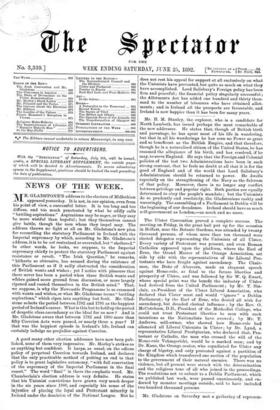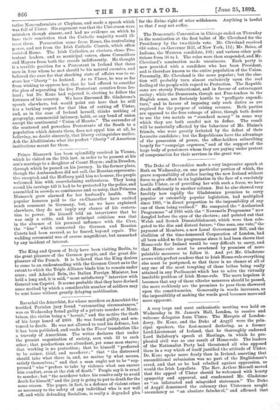Mr. Gladstone on Saturday met a gathering of represen-
tative Nonconformists at Clapham, and made a speech which was full of Ulster. His argument was that the Ulstermen were mistaken though sincere, and had no evidence on which to base their conviction that the Catholic majority would ill- treat them. Persecution came from Rome, the centralising power, and not from the Irish Catholic Church, which often resisted Rome. The Irish Catholics, as electors, chose Pro- testant leaders, and as municipal voters, chose Councillors and Mayors from both the creeds indifferently. He thought it a terrible position for a Protestant in Ireland that three men in four whom he met should be his natural enemies, and believed the cure for that shocking state of affairs was to re- store her " liberty " to Ireland. As to Ulster, he was so far from wishing to oppress her, that he had offered to consider the plan of separating the five Protestant counties from Ire- land ; but Dr. Kane had rejected it, electing to follow the fortunes of his country. We have discussed Mr. Gladstone's speech elsewhere, but would point out here that he still has a lurking respect for that idea of cutting off Ulster, and, as in the case of Ireland herself, thinks nothing of geography, commercial intimacy, habit, or any bond of union except the sentimental "Union of Hearts." The surrender of the scattered and powerless Protestants of the South to a population which detests them, does not appal him at all, he believing, no doubt sincerely, that liberty extinguishes malice. Ask the Abolitionists what the perfect " liberty" of American institutions meant for them.



































